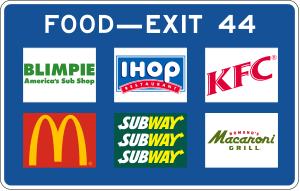Logo sign

Logo signs (also known as specific service signs or Logo service signs, or colloquially as Big Blue Signs) are blue road signs used on freeways that display the logos of businesses prior to an interchange. Typically, a business pays fees to a transportation department (or to a subcontractor of a transportation department such as Lamar Advertising subsidiary Interstate Logos) to have their logos displayed on a large panel alongside other businesses.
History
In the United States
In the United States, logo signs were permitted on rural Interstates in 1965 as part of the Highway Beautification Act. Originally, such signs were limited to the following categories: gas, food, lodging, and camping. The 1976 amendments to the Highway Beautification Act expanded the program to federal-aid primary rural highways. In 2000, provisions for allowing logo signs on urban highways (as long as adequate sign spacing can be maintained) were added to the Manual on Uniform Traffic Control Devices; however, as of 2015 not all states have adopted these provisions, with some states (such as California and New York) continuing to restrict the installation of logo signs to rural highways only. As of 2015, logo signs are permitted on urban highways in 16 states (Arizona, Colorado, Florida, Georgia, Iowa, Louisiana, Massachusetts, Minnesota, Nevada, North Carolina, Tennessee, Texas, Utah, Virginia, Washington, and Wisconsin), with Tennessee being the most recent state (as of 2015) to repeal the restriction for installing logo signs on rural highways only. The 2000 MUTCD also added the attractions category, followed by the 2003 MUTCD which added the 24-hour pharmacies category.[1] Logo signs in the United States are limited to six logos per sign, and additional signs may be used up to a total of four in each direction per interchange.[2] In 2006, the Federal Highway Administration issued an interim approval to allow more than six logo panels per service type on up to two signs per direction,[3] which was eventually incorporated into the 2009 Manual on Uniform Traffic Control Devices.
In California, as well as on the Pennsylvania Turnpike the label "GAS" is replaced by "FUEL".
In Canada
Logo signs are found along major highways in Ontario, namely 400-series highways 400 and 401. A separate signage is used for ONroute rest areas.
References
- ↑ Staff (2004) [2003]. "Chapter 2F: Specific Service Signs" (PDF). Manual on Uniform Traffic Control Devices (PDF) (Revision 1, 2003 ed.). Washington, DC: Federal Highway Administration. pp. 2F–1–2F–6. ISBN 9780935403817.
- ↑ Staff (2009). "Chapter 2J: Specific Service Signs" (PDF). Manual on Uniform Traffic Control Devices (PDF) (2009 ed.). Washington, DC: Federal Highway Administration. pp. 312–19. ISBN 9781615835171.
- ↑ "Interim Approvals Issued by FHWA". Federal Highway Administration. Retrieved November 24, 2014.
External links
| Wikimedia Commons has media related to Logo signs in the United States. |